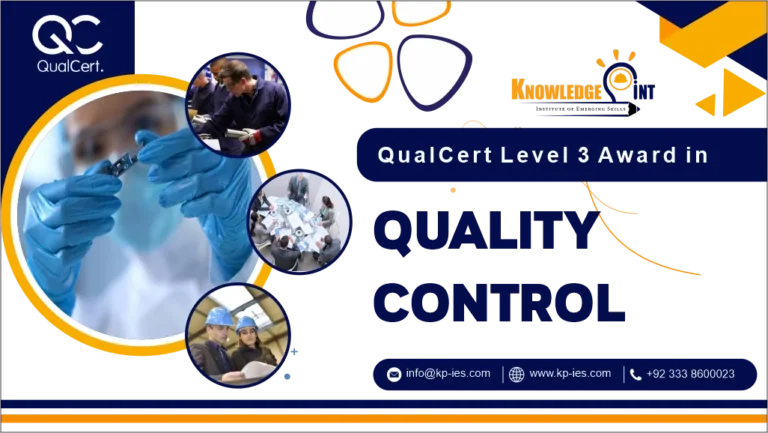In the intricate tapestry of industries, where precision and reliability reign supreme, the Level 1 Certificate in Quality Control (QC) emerges as a beacon of knowledge and a foundational step towards mastering the art of ensuring consistent and high-quality outputs. This certification not only serves as an entry point for those stepping into the world of quality management but also acts as a catalyst for career advancement and organizational excellence.
Quality control is the linchpin of success in any industry. The Level 1 Certificate in Quality Control marks the commencement of a transformative journey, equipping individuals with the essential tools and knowledge needed to navigate the complex landscape of maintaining and improving quality standards.
The Level 1 Certificate in Quality Control is not just a certification; it’s a journey toward mastery in ensuring that products and services meet and exceed the expectations of consumers and stakeholders. As industries evolve, the need for skilled quality professionals becomes increasingly apparent. Embrace the Level 1 Certificate, unlock the doors to a world of possibilities, and embark on a career path where precision and excellence are not just ideals but daily practices. The journey towards becoming a quality control expert begins here, at the foundation of knowledge and commitment to maintaining the highest standards.
Course Overview
Upon successful completion of the Level 1 Certificate in Quality Control (QC), participants will demonstrate proficiency in foundational concepts and practical skills related to quality control. The learning outcomes include:
- Understanding of Quality Control Principles:
- Articulate a comprehensive understanding of the fundamental principles that underpin quality control in various industries.
- Recognize the importance of maintaining high-quality standards for organizational success.
- Application of Quality Control Tools and Techniques:
- Apply basic quality control tools and techniques, such as checklists, flowcharts, and control charts, to monitor, assess, and improve processes.
- Demonstrate proficiency in the practical application of these tools for effective quality management.
- Roles and Responsibilities in Quality Control:
- Define and understand the roles and responsibilities of individuals involved in the quality control process within a team or organizational structure.
- Emphasize the collaborative nature of quality control and the significance of effective communication in achieving quality objectives.
- Basic Statistical Concepts for Quality Control:
- Apply fundamental statistical concepts to analyze and interpret data relevant to quality control.
- Utilize statistical methods for making informed decisions and improvements in quality processes.
- Documentation and Record-Keeping Skills:
- Emphasize the importance of maintaining accurate documentation in quality control.
- Develop skills in record-keeping to ensure traceability, accountability, and compliance with quality standards.
- Problem-Solving in Quality Control:
- Implement problem-solving methodologies to identify and address quality-related issues.
- Develop critical thinking skills for systematic issue resolution and continuous improvement in quality control processes.
- Industry-Specific Quality Control Adaptation:
- Tailor quality control principles to different industries, recognizing and addressing industry-specific challenges.
- Analyze case studies and examples to showcase successful quality control implementation in diverse real-world scenarios.
- Ethics and Integrity in Quality Control:
- Emphasize ethical considerations in quality control practices.
- Foster a culture of integrity and responsibility in maintaining and improving quality standards.
By achieving these learning outcomes, participants will be equipped with the foundational knowledge and practical skills necessary to contribute to effective quality control processes within their respective industries. The Level 1 Certificate in Quality Control serves as a launching pad for individuals seeking to advance in their careers and pursue further certifications in the field of quality management.
Course Benefits of the Level 1 Certificate in Quality Control (QC):
- Foundational Knowledge in Quality Control:
- Acquire a solid understanding of the fundamental principles and practices of quality control, establishing a strong foundation for further learning and career development.
- Enhanced Career Opportunities:
- Open doors to entry-level positions in quality control across various industries, increasing employability and paving the way for career advancement.
- Improved Problem-Solving Skills:
- Develop critical thinking and problem-solving skills, enabling participants to identify and address quality-related challenges effectively.
- Versatility in Industry Applications:
- Gain knowledge applicable to diverse industries, providing flexibility in career choices and the ability to transition between sectors.
- Contributing to Organizational Excellence:
- Play a vital role in contributing to the overall excellence of an organization by ensuring high-quality outputs and services.
- Increased Professional Credibility:
- Attain a recognized certification that adds credibility to your professional profile, showcasing your commitment to quality standards.
- Preparation for Advanced Certifications:
- Lay the groundwork for pursuing advanced certifications in quality control, providing a pathway for continuous professional development.
- Practical Application of Quality Control Tools:
- Gain hands-on experience in using quality control tools and techniques, allowing for practical application in real-world scenarios.
- Understanding of Roles and Responsibilities:
- Define roles and responsibilities within the quality control process, promoting a collaborative approach to achieving quality objectives.
- Introduction to Statistical Concepts:
- Familiarize yourself with basic statistical concepts relevant to quality control, providing a basis for data analysis and decision-making.
- Documentation and Record-Keeping Skills:
- Develop skills in accurate documentation and record-keeping, ensuring traceability, accountability, and compliance with quality standards.
- Industry-Specific Adaptation:
- Tailor quality control principles to different industries, gaining insights into industry-specific nuances and challenges.
- Ethical Considerations in Quality Control:
- Emphasize the importance of ethical behavior in quality control practices, fostering a culture of integrity and responsibility.
- Networking Opportunities:
- Connect with peers and professionals in the quality control field, expanding your network for future collaboration and learning.
- Increased Confidence in Quality Management:
- Build confidence in your ability to contribute to quality management processes, making informed decisions to improve overall organizational performance.
In conclusion, the Level 1 Certificate in Quality Control offers a comprehensive set of benefits, empowering participants with the knowledge and skills needed to make a positive impact in quality management and contribute to organizational success. Whether you are entering the workforce or seeking to enhance your skill set, this course provides a valuable investment in your professional development.
Study Units for the Level 1 Certificate in Quality Control (QC):
Module 1: Introduction to Quality Control
- Understanding Quality: Definition and Importance
- Historical Overview of Quality Control
- Quality Control vs. Quality Assurance
Module 2: Basic Quality Concepts
- Quality Characteristics and Attributes
- Common Quality Terminology
- The Cost of Poor Quality
Module 3: Quality Control Tools and Techniques
- Statistical Process Control (SPC)
- Data Collection and Analysis
- Control Charts and Graphical Methods
Module 4: Quality Standards and Regulations
- Industry-Specific Quality Standards (e.g., ISO 9001)
- Regulatory Compliance and Quality
- Quality Auditing
Module 5: Inspection and Testing Methods
- Inspection Methods and Procedures
- Sampling Techniques (e.g., Random Sampling, Stratified Sampling)
- Measurement and Testing Equipment
Module 6: Documentation and Reporting
- Record Keeping and Documentation Requirements
- Reporting Quality Control Findings
- Non-conformance Reporting and Corrective Actions
Module 7: Quality and Safety
- Safety Considerations in Quality Control
- The Interplay between Safety and Quality
- Ensuring Safe Quality Control Practices
Module 8: Quality Control in Practice
- Case Studies and Real-World Applications
- Quality Control in Various Industries (e.g., Manufacturing, Healthcare, Food)
Module 9: Quality Control Skills Development
- Problem-Solving Techniques
- Teamwork and Communication in Quality Control
- Practical Exercises and Simulations
This structured curriculum ensures that participants in the Level 1 Certificate in Quality Control course receive comprehensive training in foundational concepts and practical skills, preparing them to contribute effectively to quality control processes in various industries.
Future Progression for Level 1 Certificate in Quality Control Graduates:
Future Progression for Level 1 Certificate in Quality Control Graduates:
- Level 2 and Advanced Quality Control Certifications:
- Progress to higher levels of quality control certifications, such as Level 2 or advanced certifications, to deepen understanding and expertise in quality management practices.
- Six Sigma Green Belt Certification:
- Pursue Six Sigma Green Belt certification to gain proficiency in advanced statistical and process improvement methodologies, enhancing problem-solving skills in quality control.
- ISO 9001 Lead Auditor Certification:
- Obtain ISO 9001 Lead Auditor certification to specialize in auditing quality management systems, ensuring compliance with international quality standards.
- Quality Control Leadership Roles:
- Progress into leadership roles within quality control teams or departments, taking on responsibilities for strategic planning and guiding teams toward excellence.
- Certified Manager of Quality/Organizational Excellence (CMQ/OE):
- Attain the Certified Manager of Quality/Organizational Excellence (CMQ/OE) certification from the American Society for Quality (ASQ) to demonstrate mastery in quality management principles.
- Project Management Professional (PMP) Certification:
- Acquire PMP certification to complement quality control skills with project management expertise, enhancing the ability to lead and manage complex projects.
- Quality Control Consulting Services:
- Transition into a quality control consultant role, providing expertise to organizations seeking to enhance their quality management processes and compliance.
- Lean Manufacturing Certification:
- Obtain Lean Manufacturing certification to focus on reducing waste, optimizing processes, and improving efficiency, aligning with lean principles in quality control.
- Advanced Data Analysis Courses:
- Enroll in advanced data analysis courses or data science programs to enhance statistical analysis skills, enabling a deeper understanding of data-driven quality improvement.
- Quality Management Software Training:
- Gain proficiency in using quality management software tools to automate processes, track performance, and facilitate continuous improvement in quality control systems.
- International Quality Control Standards:
- Explore certifications or training programs aligned with international quality standards, such as ISO 14001 (environmental management) or ISO 45001 (occupational health and safety).
- Industry-Specific Specialization:
- Specialize in quality control within specific industries such as healthcare, manufacturing, or information technology, tailoring skills to industry-specific challenges and requirements.
- Continuous Professional Development (CPD):
- Engage in continuous professional development through workshops, seminars, and conferences to stay updated on evolving trends and best practices in quality control.
- Quality Control Research and Publications:
- Contribute to the field by engaging in research projects related to quality control and publishing articles or papers in industry journals or conferences.
- Quality Control Leadership Associations:
- Become an active member of quality control and management associations, participating in leadership roles, mentoring, and contributing to the advancement of the profession.
- Entrepreneurship in Quality Management:
- Explore entrepreneurial opportunities by establishing a quality management consultancy or offering specialized quality control services to businesses.
By strategically pursuing these future progression avenues, graduates of the Level 1 Certificate in Quality Control can continuously elevate their expertise, contribute significantly to their organizations, and shape the future of quality management in diverse industries.







